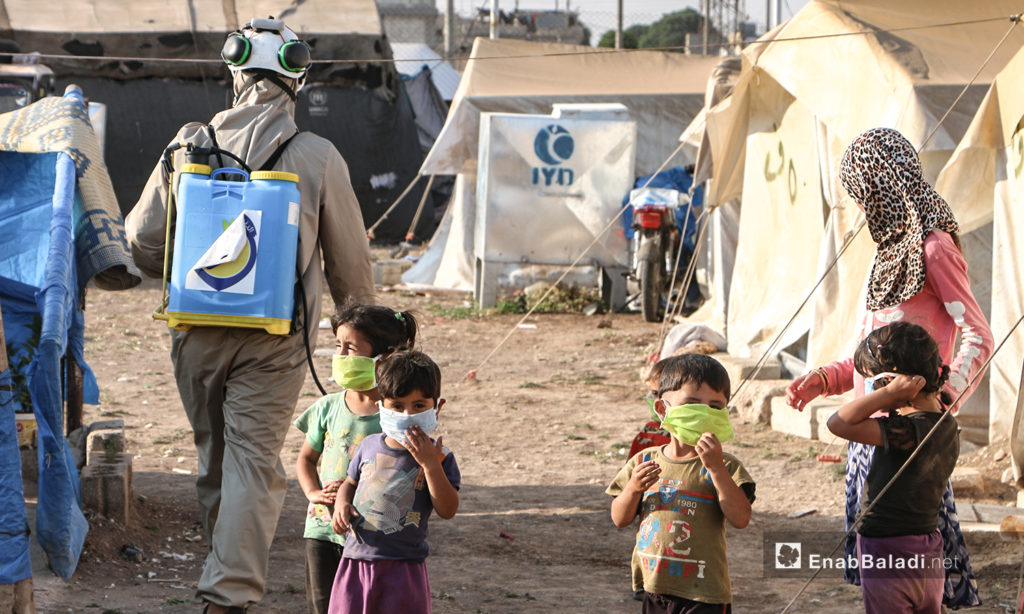With the Syrian regime’s continuing violations of the ceasefire in the war-ravaged province of Idlib, provided for in the agreement signed between Russia and Turkey last March, the residents’ fears of a new military operation in the region grow, threatening an additional wave of displacement that may be more dangerous than its predecessor due to the spread of the novel coronavirus (COVID- 19). The coronavirus hit northern Syria, which has registered 31 coronavirus infection cases until the report was prepared.
In the past few days, there have been a series of indications of a future military escalation, including the utmost military preparedness of both parties; the Syrian regime mobilizes more of its forces on the outskirts of Idlib, while the Syrian opposition factions announce extensive military preparations, equipment, training, and graduation of military courses for the opposition fighters on a daily basis.
Airstrike and military escalation
One of these indications is that the Syrian regime forces resumed bombing Syrian opposition-held areas, including the towns and cities of Jabal al-Zawiya and the southern countryside of Idlib, especially the towns of Sufuhon, Kafr Oweid, al-Maouzrah, Kansafra, and Ain La Rose in Jabal al-Zawiya, south of Idlib.
Explosive missiles also targeted the Watad Petroleum Company in the city of Sarmada, Idlib, for the second time in two weeks, which led to the outbreak of fires, the director of the media office in Watad, Safwan al-Ahmad told Enab Baladi.
He confirmed that the “Grad” missiles, believed to be three, bombed the market consecutively.
In retaliation, the “al-Fateh al-Mubeen” operations room, which includes “Hay’ at Tahrir al-Sham (HTS),” “The National Front for Liberation (NFL),” and “The Army of Victory,” bombed the locations of the Syrian regime forces in rural Idlib.
Local media outlets circulated news that the Turkish forces in Idlib are increasing their combat readiness. However, a military source in the NFL, who spoke on condition of anonymity, affirmed that the Turkish troops asked the region’s factions to prepare for any military action by the Syrian regime forces soon.
The source pointed out that the Turkish government did not raise its army readiness, but only warned of the regime’s military build-up on the outskirts of Idlib and its countryside, noting that the Turkish forces were not on a tactical alert in the region.
Distracting “Syria’s Civil Defence”
Violations of the Syrian regime forces in Jabal al-Zawiya, which amounted to 1,600 since the announcement of the ceasefire, according to the “Syrian Response Coordination Group” (SRCG), gave rise to internal displacement in the past few days.
Muhammad Hallaj, the director of the SRCG, warned of a new wave of displacement in light of the challenges in the event of launching a military operation in the region.
Hallaj told Enab Baladi that the start of any military operation will lead to a massive wave of displacement, and the residents’ resort to the camps, amid fears of this due to the spread of the “coronavirus” in the region. People cannot follow prevention guidelines and rules of social distancing, in addition to that, the region suffers from the poor health services inside the camps.
The member of the media office in the Directorate of “Civil Defense in Idlib,” Firas Khalifa, explained to Enab Baladi that there are currently few displaced people despite the bombing, due to the congestion in the camps, the high prices, and the weak material ability of civilians to rent homes, along with the spread of the “COVID-19”. In northern Syria, civilians are forced to prefer living under bombardment to displacement.
Khalifa warned of a fresh wave of displacement, which will put further pressure on the “Syrian Civil Defense” and the dispersion of its efforts involved in practicing measures for prevention of COVID-19, as well as providing disinfection services, and awareness campaigns.
Khalifa pointed out that preventing congestion in the displacement camps or shelters will be something difficult to achieve, given the overpopulation in the region and the small number of camps.

